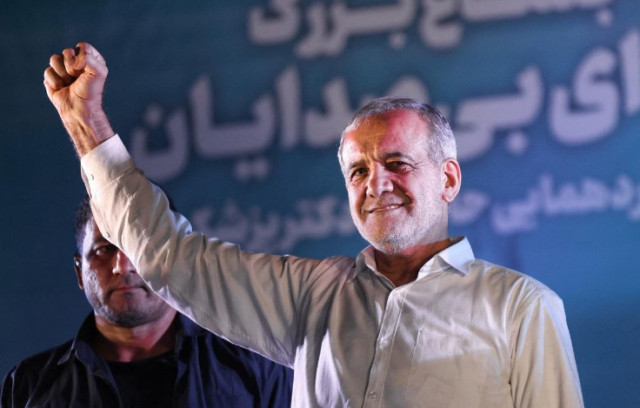Reformist candidate Masoud Pezeshkian has won Iran's runoff presidential election on Saturday.
Pezeshkian promised no radical changes to Iran’s Shiite theocracy in his campaign and has long held Supreme Leader Ayatollah Ali Khamenei as the final arbiter of all matters of state in the country.
But even Pezeshkian’s modest aims will be challenged by an Iranian government still largely held by hard-liners, the ongoing Israel-Hamas war in the Gaza Strip, and Western fears over Tehran enriching uranium to near-weapons-grade levels.
A vote count offered by authorities put Pezeshkian as the winner with 16.3 million votes to Jalili’s 13.5 million in Friday’s election.
Overall, Iran’s Interior Ministry said 30 million people voted in an election held without internationally recognized monitors.
Supporters of Pezeshkian, a long time lawmaker, entered the streets of Tehran and other cities before dawn to celebrate as his lead grew over.
“Dear people of Iran, the elections are over and this is just the beginning of our cooperation,” Pezeshkian wrote on the social platform X, still banned in Iran.
“The difficult path ahead will not be smooth except with your companionship, empathy and trust. I extend my hand to you and I swear on my honour that I will not leave you alone on this path. Do not leave me alone.”
Pezeshkian’s win still sees Iran at a delicate moment, with tensions high in the Mideast over the Israel-Hamas war, Iran’s advancing nuclear programme, and a looming election in the United States that could put any chance of a detent between Tehran and Washington at risk.
Pezeshkian’s victory also wasn’t a rout of Jalili, meaning he’ll have to carefully navigate Iran’s internal politics as the doctor has never held a sensitive, high-level security post.
The first round of voting on June 28 saw the lowest turnout in the history of the Islamic Republic since the 1979 Islamic Revolution.
Iranian officials have long pointed to turnout as a sign of support for the country’s Shiite theocracy, which has been under strain after years of sanctions crushing Iran’s economy, mass demonstrations and intense crackdowns on all dissent.
Government officials up to Supreme Leader Ayatollah Ali Khamenei predicted a higher participation rate as voting got underway, with state television airing images of modest lines at some polling centres across the country.
Authorities put the turnout in Friday’s election at 49.6%, still historically low for an Iranian presidential election.
They counted 607,575 voided votes in the contest — which often are a sign of protest by those who feel obligated to cast a ballot but reject both candidates.
“I don’t expect anything from him — I am happy that the vote put the brake on hard-liners,” said bank employee Fatemeh Babaei, who voted for Pezeshkian. “I hope Pezeshkian can return administration to a way in which all people can feel there is a tomorrow.”
The election came amid heightened regional tensions. In April, Iran launched its first-ever direct attack on Israel over the war in Gaza, while militia groups that Tehran arms in the region — such as the Lebanese Hezbollah and Yemen’s Houthi rebels — are engaged in the fighting and have escalated their attacks.




















